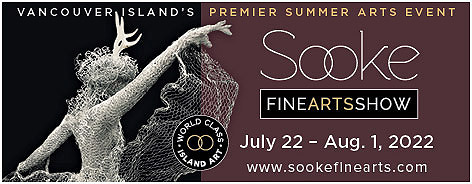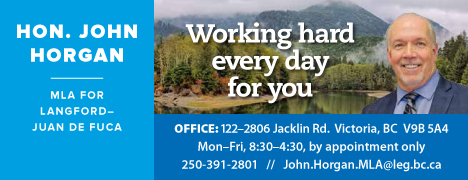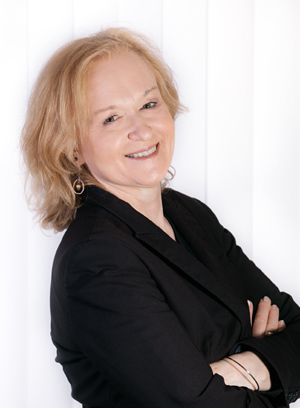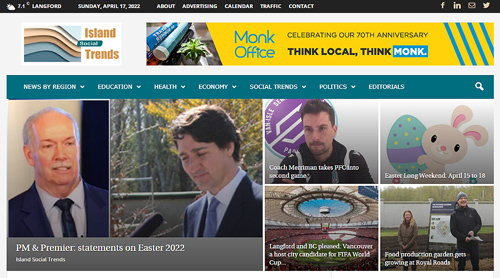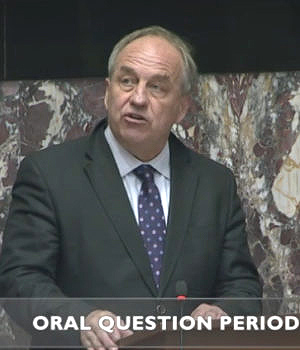
Monday April 18, 2022 | VANCOUVER ISLAND, BC
EDITORIAL FEATURE by Mary P Brooke, B.Sc., Cert PR, Editor | Island Social Trends
Easter Monday is as good a day as any to tell this tale. Here we are in April 2022, in a world where humanity is in the third year of a global pandemic. And most people now also have a much heightened sense of a planet in climate crisis, particularly in British Columbia due to events of the past year. There’s also a war ‘abroad’, which could yet still bite closer to home.
Let’s see how the story of climate scientist, university professor and former-politician Andrew J Weaver is woven into this trio of major concerns.
Island Social Trends interviewed the high-profile self-styled leader after he addressed teens during their annual career day, at Royal Bay Secondary School (the largest high school in SD62 in Greater Victoria’s west shore region), on March 16, just ahead of spring break.
Pivoting into politics:
Back in 2011, Dr Weaver was named one of 10 members of the Expert Panel on Ocean Climate Change and Marine Biodiversity commissioned recently by the Royal Society of Canada. He brought that expertise into politics in 2013, by running as the BC Green candidate in Oak Bay-Gordon Head and winning a seat in the BC Legislature that year. Four years passed.
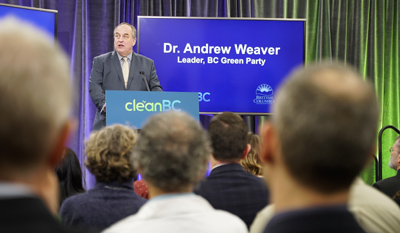
The May 2017 BC provincial election was tight. Technically, the BC Liberals won more seats, but the NDP had a razor’s-edge possibility to form a ‘progressive’ government if he could harness the support of just three BC Green MLAs, and NDP Leader John Horgan had the good luck of having in the Lieutenant Governor’s chair Judith Guichon, who clearly seemed to have had enough of BC Liberal shenanigans as seen over 16 years.
At that pivotal moment in BC politics, Weaver made national headlines by propping up the Horgan NDP with a Supply & Confidence agreement — allowed by Guichon — after the May 2017 provincial election. That allowed the NDP to govern as if with a majority, well into 2020.
After Weaver stepped down as leader of the BC Green Party leadership at the end of 2019 and in 2020 retired as an MLA (he left the Green caucus in January 2020 and continued to sit as an independent member but did not run for reelection in the 2020 BC election), Premier Horgan looked nervously to his odds of political stability for his NDP government he called an election for September 2020.
That was in the middle of a pandemic that was still without vaccines for an immunization program, so sure that he was of the need for uninterrupted political momentum through the upcoming economic recovery. With a fully majority achieved in September 2020, Horgan’s “for the people” government is on a solid run through 2024. It was called a ‘power grab’ by the two remaining BC Green MLAs, but could arguably have been underscored as dead-right by Horgan who believed in the power of what an non-confronted government could do. All good things come to an end; NDP won’t be in forever, as Horgan has reminded his MLAs from day one — work every day like it’s your last (as in much to be done, so let’s get to work).
Recognizing your comfort zone:
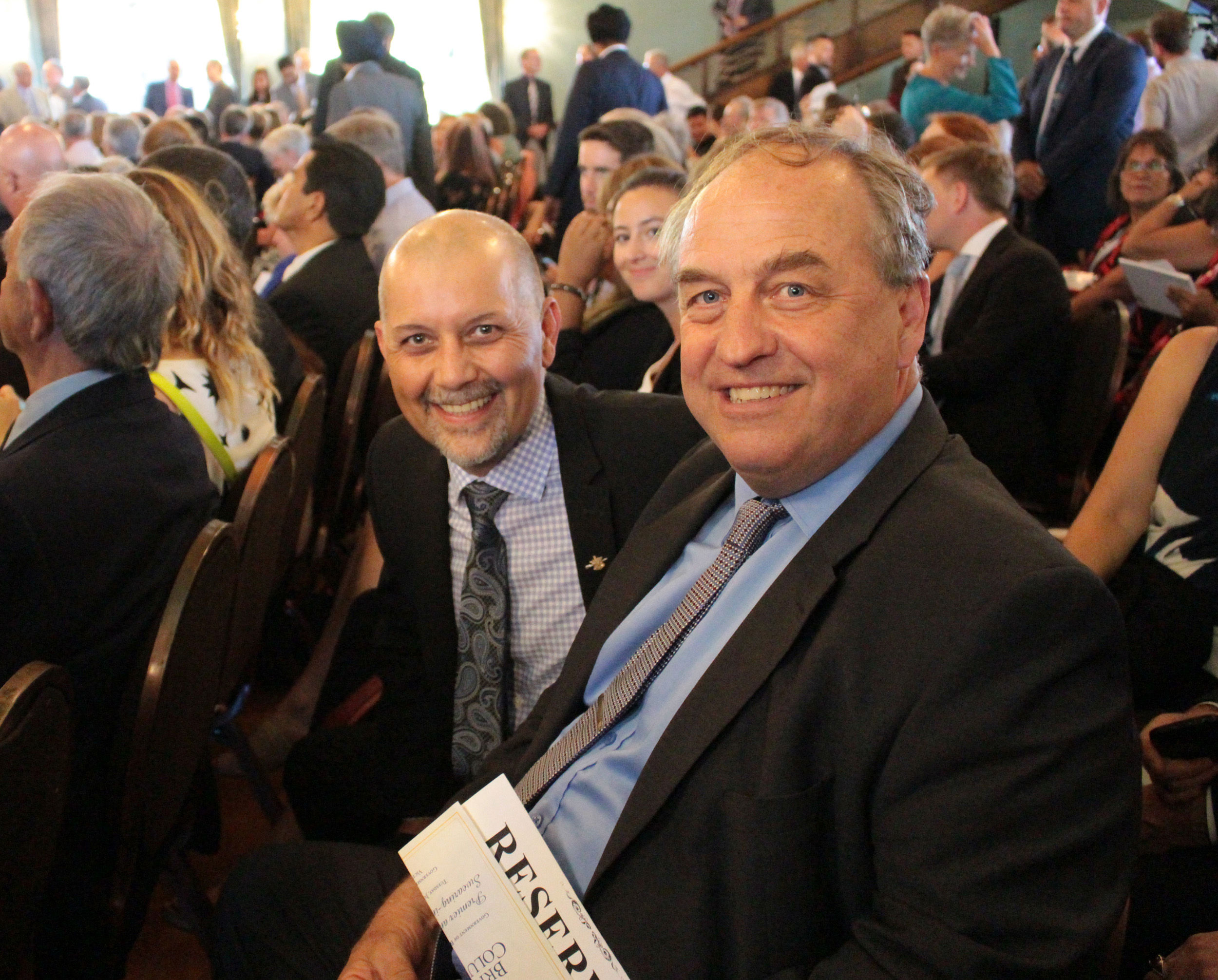
Reporting on Horgan since 2008 (here in his riding on the west shore of Vancouver Island), Island Social Trends feels confident in reading a brief moment in Horgan’s expression and tone when Weaver stepped back from politics, as if to say: ‘when you have this much power, why would you abandon it?’
Well, as an attentive citizen, when you see an urgent need you address it, even if it means stepping outside your comfort zone. And once the goal is accomplished, it’s important to know when to step back.
Over 10 years ago, when climate scientist and professor Andrew Weaver realized that he had been identifying for his students that political change was required in order to facilitate climate change, he stepped up and put his feet to the fire.
Weaver stepped out of his teaching-career comfort zone and into the political fray. He did a good job there, but he was always clear about his reasons for doing that, which helped to know when it was time to step back.
Weaver handled elected politics with aplomb. But he seems glad to be back at the University of Victoria, guiding youth as the next generation of leaders. He is still influencing attentive community leaders in politics, as well as through the media and his own impact in social media (including his 28,700 followers @AJWVictoriaBC on Twitter).
Climate change requires political change:
Intense heat was highly dramatic last year, not only to live through but it made international headlines in that BC seemed unprepared for the five-day heat dome in June 2021 which led to hundreds of deaths (mostly among seniors in urban situations with poor air and temperature management).
Last year there were also wildfires (on the tail of record-breaking wildfire summers in 2017 and 2018) causing people to evacuate their homes and communities, which contributed to air quality concerns across BC. Live and learn. The BC Ministry of Forests is holding a press conference tomorrow (well ahead of the 2022 fully active wildfire season) about wildfire prevention, preparedness, response and recovery.
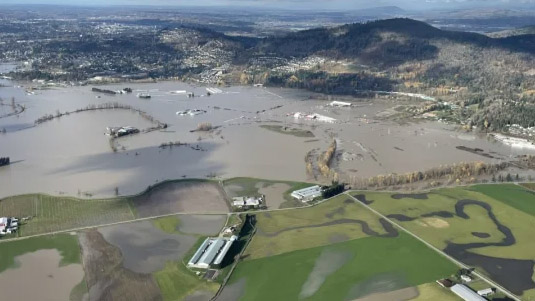
There was flooding so extreme last fall that entire farms were wiped out, bringing food supply chain issues to the forefront for British Columbians. Live and learn. The BC government worked for months to prepare reparations in the flood-stricken areas, starting with months of debris removal. They have acknowledged fire-smart Indigenous ways to protect homes and land in wildfire-prone areas (one property in Merritt, BC that did not burn down last summer has been protected in that manner).
Into the political fray:
Back in 2013, when Weaver became an MLA, that changed his career trajectory. And it clearly changed not only the provincial government’s climate policy for the better, but then tipped the scales in favour of the federal government’s climate change direction (he endorsed the Liberal Party of Canada’s climate change plan during the Fall 2021 election).
After his goal with the BC NDP government’s CleanBC plan nicely on its way, Dr Weaver stepped back from leading the BC Green Party at the end of 2019, and stayed on as an MLA until the 2020 election. He went back to his role as a professor at the University of Victoria. Dr Weaver’s main areas of research are climate change policy, research, solutions and communications; his former focus included the role of oceans in climate change/variability, ocean/climate modelling, paleoclimate, physical oceanography and geophysical fluid dynamics.
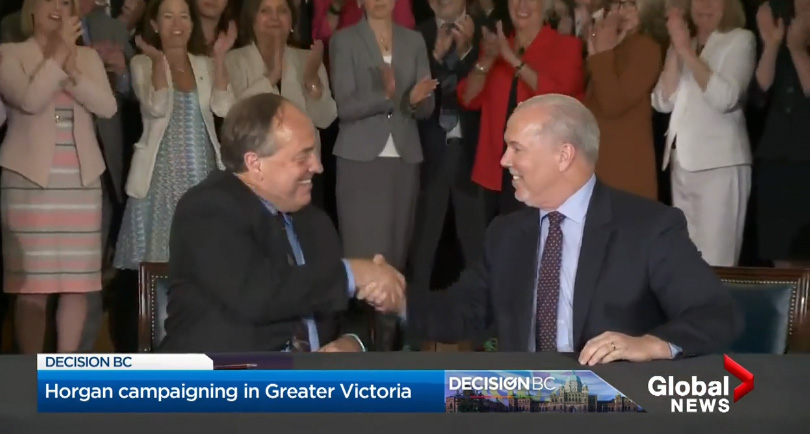
Not only was it about fostering political will for making a significant change in government policy, the overview of Weaver stepping into, through and out of elected politics shines a light on the need to pull specific types of expertise within the inside government track.
A lot of politicians are not necessarily also educated at a post-secondary level in specialized areas of socioeconomic need (like climate science in Weaver’s case, or history in Horgan’s case). If political decisions are left to the sway and whims of the day, the current political system will remain open to the pitfalls of short-term gain, including inaction, mediocrity, and corruption.
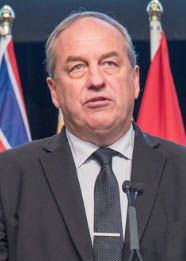
If political parties can somehow attract candidates with expertise in certain scientific, sociological or economic specialties — and give them the team and backing that, by career default, they may not have been building — there is a chance for a significant sea-change in political systems in Canada. Weaver agrees on this point.
We can see that while the Horgan-Weaver combination is a high-profile example with identifiable long-term outcomes, there are similar examples in the various federal Trudeau cabinets (e.g. Steven Guilbeault, once a climate activist, placed as Environment and Climate Change Minister in 2021), and in the Horgan BC provincial cabinet (e.g. Bowinn Ma with a background in engineering as Minister of State for Infrastructure, underpinning Rob Fleming with his economics background as Minister of Transportation and Infrastructure).
That strategy doesn’t always work out so well if the hand-picked specialist lacks political sensibilities (such as then-new Prime Minister Justin Trudeau appointing Dr. Jane Philpott, a medical doctor, as his health health in 2015; continuing as Indigenous Services minister then President of the Treasury board, she lasted to March 2019).
Climate change offers opportunities:
Being as Weaver was at a high school career day on March 16, talking to teens, he explained his approach in addressing the teenage audience.
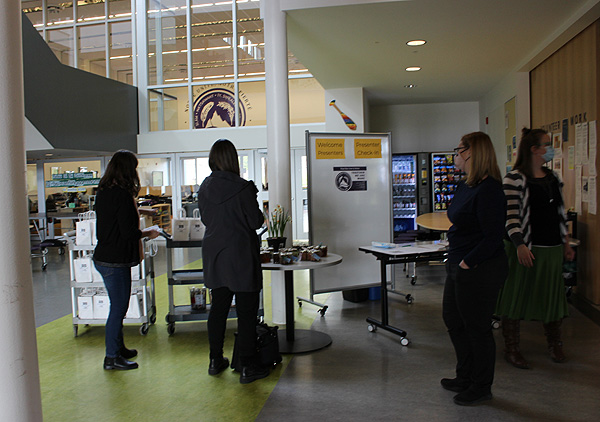
First he inquired about their interests. He heard agriculture, clean energy, marine biology and architecture. “Okay, now let’s talk about the notion of climate change, from the lens of the opportunities it creates,” he told the students assembled from Grades 9 to 12.
“We often talk about this through the lens of the challenge and the problems. But really every environmental challenge can be seen through the lens of the opportunity it creates for innovation, prosperity, and creativity,” the UVic prof said.
With transportation as an example: “If you build electric cars, you’re still polluting. Let’s see if we can take the transportation sector and let’s brainstorm some solutions on transportation. If everyone’s driving a gas-powered car, that’s not solving anything. Forty percent of BC emissions are from transportation. We have to deal with it. We know in BC, that our energy is 98 percent renewable. So if you switch to an electric vehicle, in BC you’re actually reducing emissions,” Weaver explained.
He continued: “However, as population grows, if everyone keeps driving singular vehicles, we’re going to have a problem. So you’ve got to couple that with an active transportation strategy. So there’s innovation potential there. There’s job opportunities for youth and ideas in active transportation.”
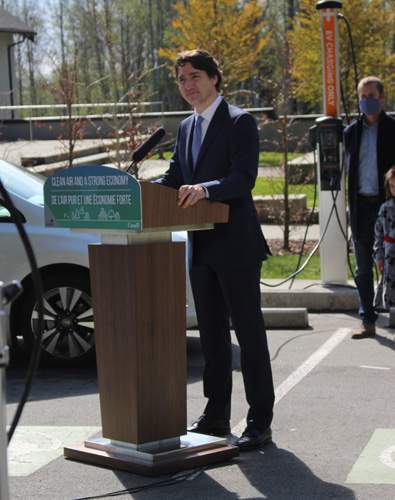
“And also, when you build that electric car, of course there’s gonna be minerals. So now you have to think of innovative ways of extracting the minerals that are cleaner and greener. For example, in the production of steel, we’re now developing technologies that actually replace the requirement of coke in the steel-producing process to eliminate the emissions coming from the steel. Then we also then have to think about mining, for lithium for the battery. There’s innovation in companies like MineSense (MineSense Technologies Ltd) in Vancouver, that are finding effective more efficient means of extracting sediment.”
In recent weeks, the federal government has announced a major investment in a battery-manufacturing plant. Last week in Colwood, Prime Minister Justin Trudeau promoted the transition to electric vehicles (EVs); he was accompanied by Clean Energy Canada Executive Director Merran Smith who noted that the $4.9 billion Stellantis battery plant in Windsor, Ontario will create 2,500 jobs and produce enough batteries to power about half a million EVs every year.
Talking to youth:
“I’m really worried that there’s a lot of hysteria out there on the climate issue, which leads to despondency,” Professor Weaver told Island Social Trends.
“The youth of today have got enough to worry about,” said Weaver. He rattles off the top of the list: Ukraine, Russia, climate change, COVID. “Like, these guys have spent two years not being youth. The last thing we need to do is not scare the crap out of them on one more thing. So my main emphasis (in the career session) was trying to see every environmental challenge through the lens of the opportunity to create change,” the prof said.
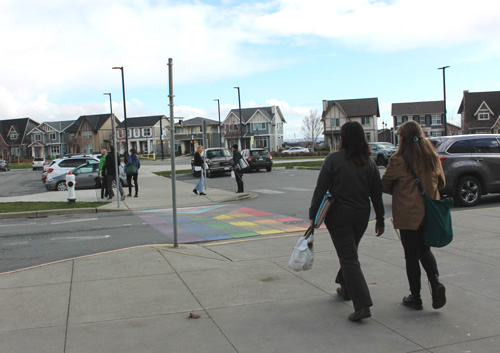
And it loops back to politics. Youth can help foster change through politics. Weaver says it’s about “the importance of advocating for what you want, as much as what you don’t want”. He notes that politicians “deal with what you don’t want, all the time… but what they don’t hear is what you do want”.
“And when you get what you want, you think ‘okay I’m done’. But he articulates that politicians actually need continued support, to actually implement it.
Stepping up where needed:
Weaver’s winding path through science, academics and politics is a perfect example of personal commitment voluntarily expressed within in the societal realm. His path and choices are an ideal example of how politics is ideally meant in its purest form to work… i.e. for individuals with something focused to say, or with a view that will change the socioeconomic or sociopolitical landscape, to enter the political arena, get the job done, then step back.
That’s in stark contrast to the many examples of ‘career politicians’ who work their way through and up the political ranks, becoming part of a system in which change is made within the lens of being ‘politically correct’, if it happens at all. Government is highly structured, with tendrils into non-profit organizations, community organizations, and a wide range of businesses who either benefit or suffer on the fringe. Change can be done that way, by immersing one’s self into the gears of the bigger machine. Arguably, it’s also heroic (as in giving onself to a larger purpose through service to broader society).
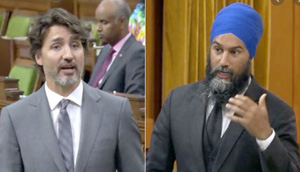
Societal change as directed by public policy is almost always methodical and slow, as gears of the system get adapted in safe and perfunctory ways. However, swift changes made under duress during the pandemic in 2020 and 2021 can be seen as an important exception. That was a clear example of how government can take decisive action in the blink of an eye… and more importantly, that the results are not always too scary.
In Canada, the Canada Emergency Response Benefit (CERB) payments in 2020 saved the bulk of the population from crashing into financial crisis (pushed to fruition by the federal NDP, providing reason to the Liberals who at first would have offered only half the eventual $2,000 per month). After that happened, the federal government wasn’t timid about spending money where it mattered. It could be argued that the confluence of federal NDP ‘for the people’ politics — together with the big sweeping powers of a Liberal government — led to the Liberal-NDP Delivering for Canadians Now – Supply and Confidence Agreement as announced on March 22, 2022 (effectively stabilizing the federal political scene into 2025).
Witnessing the speed at which government could move, when it mattered, has ignited a manner of social licence for government to start spending more on climate change and longer-term infrastructure investments. There’s even now an implicit ‘okay’ from the general population for pushing the boundaries of previously contained budget areas like defense spending during now the Ukraine crisis. That no doubt was facilitated thanks to Canadians seeing how they mostly got bailed out by generous spending and the country didn’t crash.
Did stepping into politics work?
Did stepping into the political arena work? “Oh yeah, I got exactly done what I wanted to do,” Weaver told Island Social Trends. “I was a climate scientist who at the peak of my career took a 50 percent salary cut, to go into the legislature, to raise the issue of climate change, because I could not stand by and watch the dismantling of our leadership,” he said.
We note this brave move on Weaver’s part does also underline the fact that people need to be financially stable if not well-resourced as a baseline for entering mainstream politics.
Weaver explained that was when then-premier Christy Clark “started to go all-in on LNG, which was nothing more than (true) folly”, said Weaver, explaining it was not economical at the time. “As a climate scientist, I could not bring myself to write another paper on the science when we know what the problem is,” said Weaver, as one way to explain his career pivot.
“I felt the barrier to solutions was political will. And so the first term I raised a lot of the issues and it made the NDP a little bit nervous, very nervous. And so they started talking about these issues. And then when we held the balance of power, we were able to negotiate an agreement. And I can say unequivocally that we would not have a climate agreement in BC if it were not a condition of my support for the BC NDP,” Weaver declares for the record.
“That turned out to be an extremely productive process though. Because there was a lot of political division between Green, NDP and Liberals,” Weaver told Island Social Trends, recollecting the timeline. “But when I was negotiating with Carole James, John Horgan, and George Heyman on the climate file, we had the same shared values, and realized that we were really coming from the same place. That made the negotiations so easy,” he said, noting that “when you really have the same values”, you can get things done.
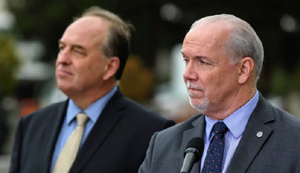
“So we realized we’re not the people the media are saying we are. The media saying the John Horgan is, is not the John Horgan I know. And he’s saying I’m not the Andrew Weaver he knows,” said Weaver. That led to a breakthrough in policy progress.
“So we got on with it, and we put together CleanBC, recognizing it wasn’t completely finished. They proceeded with the roadmap, and everything that we wanted was done, including the creation of CleanBC, which is an innovation fund, which is there to seed solutions in the innovation sector,” says Weaver about the history is that not really so old but already seems a long time ago.
CleanBC was officially announced on December 5, 2018 by then BC Green Leader Andrew Weaver, Environment Minister George Heyman and Premier John Horgan. ‘I’m greatly encouraged by the spirit of hope and collaboration with which this plan was written,’ said Weaver on that day.
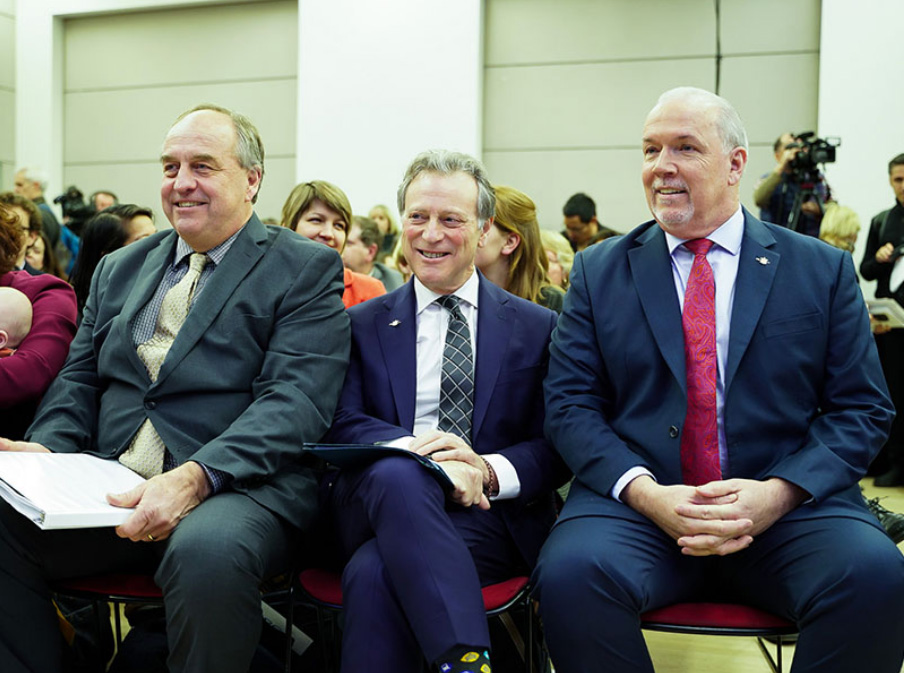
“So, I’m really pleased with what we did. I’m very proud of it. I think the NDP have continued a very fine job in this area. And what’s even more pleasing is the federal Liberals copied it.”
Did it irk the BC NDP that Weaver supported the Liberals in the summer/fall 2021 federal election campaign? “No, not at all. I have always supported good public policy. I couldn’t care less (about party stripe); if Stephen Harper had come in with a great climate policy I would have supported it.”
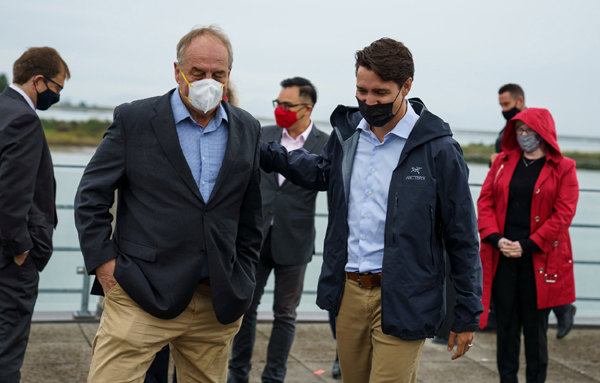
Weaver says the Liberal climate plan and the BC climate plan are ‘like this’ (fingers held close together). “John Horgan is thrilled with the Liberal climate plan because it matches the BC plan. The BC NDP government knows how to work with the federal Liberal government. And that is quite unique. There’s no point fighting the feds. You can get so much more done if you work with the feds.” says Weaver, clearly demonstrating his practical approach to politics.
In September 2021 when Trudeau included Weaver in his press announcement about the Liberal climate plan it was clearly an emotional moment for the climate scientist. His life’s work had met a sterling pivotal moment for society and the planet. That’s not to say the Liberal plan in 2022 and going forward won’t be met with obstacles and perhaps still include deficiencies, but it’s a no-turning-back moment in Canadian political commitment to dealing with climate change.
“And that’s the same philosophy John and I had. We could fight, or we could work together. And John feels that as well. And I know, because I spoke to Trudeau a couple of weeks ago, and I spoke to Horgan a couple of weeks ago,” Weaver stated.
Speaking up where needed – COVID:
Last month, after Dr Weaver addressed high school students during a career day at Royal Bay Secondary School in Colwood (for our national readers, that’s a growing suburban area within the western communities of Greater Victoria on south Vancouver Island), he did an interview with Island Social Trends.
Weaver gladly did that outdoors, due to COVID still swirling in the community. He had just spent about three hours indoors with hundreds of students and staff, in three rotated groups. He insisted that everyone in his classroom that day wear masks, and everyone complied.
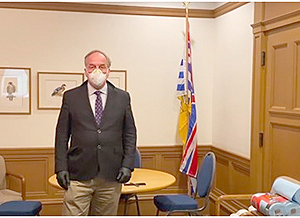
Even outdoors, he insisted we both wear masks for this media interview. No problem.
During that chat, Weaver expressed concerns about the lack of clear health communications from the provincial level, noting that the COVID-19 pandemic is not over and that the virus is airborne. He bemoaned the fact that COVID was spreading widely on the University of Victoria campus already in early March. So it was not surprising when Weaver announced on Twitter April 14 — just ahead of this Easter weekend — that after all his efforts for over two years during the pandemic that he had now come down with a symptomatic COVID infection.
There has been much flutter and fuss on social media about that over the long weekend… folks online ran the spectrum from confusion to outrage as to why a ‘loyal and courageous, formerly of the government’ leader was speaking out against the province’s public health policy led by the popular Dr Henry.
Well, there are at least two reasons why Weaver has spoken up. From a science perspective it was obvious (even in mid-March) that the the Omicron variant of COVID-19 (then at the BA.1 phase but with alert for BA.2) was still circulating; people were symptomatic, staying home from work and from campus, and hospitalized case counts were persistent. Also, he was of the view that the BC government’s public health communications strategy around COVID was faulty.
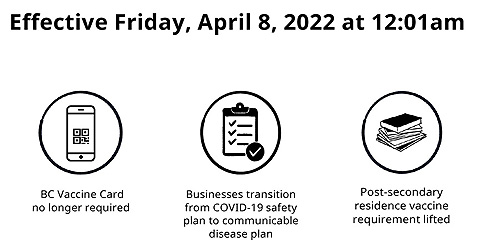
Going deep for a moment here on COVID communications in BC (Island Social Trends commentary):
- Indeed, the COVID public health communications strategy in BC — while on the forefront given Provincial Health Officer (PHO) Dr Bonnie Henry’s expertise in epidemiology — has been imbalanced. There was either too much or too little information, which sometimes overloaded media then sometimes undersold the hard-working media who know how to turn a phrase for their audiences. As public health started to hold up the BC CDC website as the be-all-end-all of information sources, that actually felt oppressive to many; no criticism of the data or personnel efforts, but yes a criticism of being a lack of realization that most people aren’t equipped to or don’t want to become overnight armchair epidemiologists.
- Once the provincial government realized the power of social media for delivering their official COVID information, they eclipsed the news media process, and often just dropped loads of daily-count data without context and with government spin. The role of professional news media is to present new information within a societal context. When the PHO would refer to ‘the young people in her life’, she may have revealed the source of her gravest error… a small slice of youth at one comfortable socioeconomic level does not the fuller youth-population represent.
- In BC, young adults were left to last in the immunization queue in BC, even in the face of real evidence of long-haulers symptoms among one of the most exposed groups in society due to their level of social interaction at work, school or raising a family. Island Social Trends was the first media outlet to ask Dr Henry about youth being left to last in the immunization queue, and about long-haulers (as well being the first to ask about MIS-C in children, and as very early on in February 2020 observing that the COVID (SARS-CoV-2) virus was airborne, which BC Health definitively denied). The flip-flop on the importance of using masks during COVID has been a mystery. A medical mask (like the blue disposable ones) is clearly worn in medical situations and for years has been worn by visitors to long-term care; they work. Trying to manage the public with downplaying the importance of masks (i.e. ‘they are only one tool’) was also possibly the other greatest mistakes in BC’s COVID messaging over two years. Declaring an ‘easy phase’ of COVID for spring and summer 2022 — as a way to give people a break — was rolled out by Dr Henry in March as a way to ease socioeconomic tensions. But for many it was a way to just ‘throw away the mask’ and many other attentive methods like physical distancing. At whose risk?
- [Note: Island Social Trends wrote an editorial about COVID communications management back in April 2020, identifying early-on the crisis that would emerge as public health and politicians figured out how to sail the COVID ship in terms of communications, science, and who is really in charge.]
What Andrew Weaver said about getting COVID:
As posted on Twitter on April 14, 2022:
- “Testing positive for COVID 19 after 2 years of super vigilant N95 mask wearing, hand washing, etc just sucks. I wish that the @CDCofBC and @bcndp government were forthright a few months ago saying that they were giving on preventing spread and moved into “herd immunity” mode,” wrote Weaver on April 14 to his more than 28,700 followers on Twitter.
- “The poor communication of public health intentions undermines confidence in our health leaders. I understand the BA.2 evidence but transparency, and intention signalling is important… If I got COVID-19 with my hyper vigilant approach to avoidance, everyone likely will!”
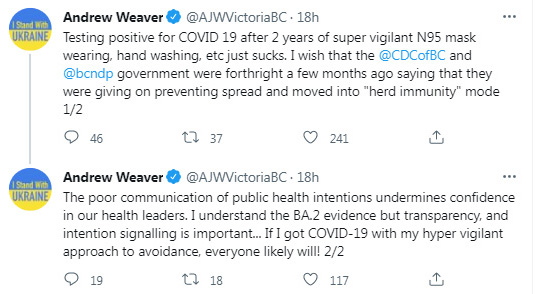
As far back as December 2021, Weaver was tweeting his concerns:
- “Not sure I understand why gyms are closed while large venues are not. I’m not convinced data supports this.
- “This is a question that needs to be answered with evidence. My greatest fear is that politics will trump evidence in B.C. Centre for Disease Control (BCCDC) decisions.”
On the Ukraine front:
Andrew Weaver’s family on his mother’s side hails from Ukraine, years ago. His mother was born in Derazhnia, and half his family is still in Ukraine. He carries concern up-close, as one of his cousins is now in the Ukrainian army. “His family is in Kharkiv (in northeast Ukraine), and they’re still there. They can’t get in touch with him,” said Weaver.
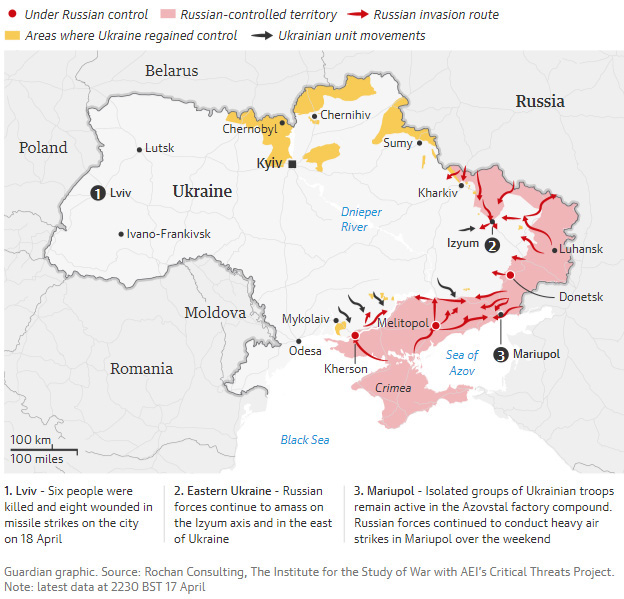
When it was suggested Weaver was wearing the stress of that family situation rather well, he said: “No I’m not.”
And Weaver contributed his thoughts about Russia’s invasion of Ukraine: “I think Putin thought it was going to be three days. They’ve lost actually. This is the problem. This is an unwinnable situation for him now. They’re bombing the apartment blocks in big cities. But it’s going to be street-by-street guerilla warfare, with people who are determined to save where they live. Against a bunch of conscripts who don’t know why they’re there. Talk about motivation differences,” Weaver opined.
Most of the rest of us are being supportive in ways that we can (there are many initiatives to support Ukrainian refugees coming to Canada, or in their scenarios in countries bordering Ukraine, or even in Ukraine).
===== ABOUT THE WRITER:
Island Social Trends Editor Mary P Brooke, B.Sc., Cert PR has been covering the news of the south Vancouver Island region since 2008.
Ms Brooke is the founder of a series of socioeconomic news publications that have been based in the west shore region. First in the series was MapleLine Magazine (2008-2010), which morphed into Sooke Voice News as a print weekly (2011-2013), then into West Shore Voice News as a weekly print/PDF (2014-2020).
Stepping away from the print format and going fully online mid-2020, Mary has taken her insightful approach to journalism island-wide (including BC and national news) at islandsocialtrends.ca.
Island Social Trends subscriptions are available — free, economy or premium.




